1913 items found
Page 117 of 160
-
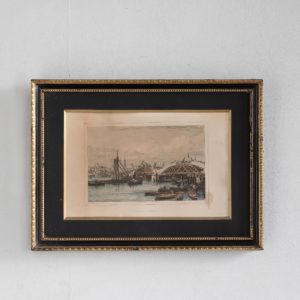
The Works of New London Bridge by Edward William Cooke RA,
£450The Works of New London Bridge by Edward William Cooke RA,
A hand-coloured engraving by George Cooke of a drawing by his son Edward William Cooke RA, from ‘The Works of New London Bridge’. In 1800 it was first proposed that the inconvenient medieval bulk of old London bridge should be removed to ease traffic on the Thames and a competition was held to design a replacement. In 1824, the plans of the engineer Sir John Rennie were accepted and a site was chosen 180 feet west of the old bridge. On June 15, 1825, the Lord Mayor of London, John Garratt, laid the first block of Dartmoor granite in the presence of the Duke of York. For a short time Londoners were able to view both the old bridge and the new side-by-side. It was to be a structure of 5 arches, over 928 feet long and 49 feet wide. When the new bridge was finished and opened by King William and Queen Adelaide in 1831, traffic switched to the huge new structure and the demolition commenced on the old bridge. Edward William Cooke (1811 – 1880) was a draughtsman, illustrator, wood engraver, etcher and painter of rural and coastal scenes in oil and watercolour. In this print Cooke shows new London bridge in the middle stages of construction with the forms for the arches still in place. On the far bank of the Thames the viewer can see the Fishmongers Hall, the steeple of St Magnus the Matryr church and The Monument.£450 -
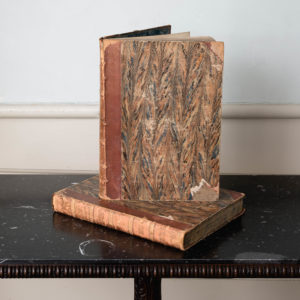
Picturesque Views on the River Thames by Samuel Ireland, 1792
£850Picturesque Views on the River Thames by Samuel Ireland, 1792
2 Volumes of 209 and 258 pages with 52 aquatint plates picturing views along the river Thames including Blenheim Castle, Windsor Castle, London bridges, Westminster Abbey, and The Royal Naval Hospital at Greenwich. Original half calf, marbled binding of 1792, rubbed and worn with faint spotting. Samuel Ireland produced a series of these scenic views of British rivers at the end of the 18th Century as the fear of French invasion prompted a national turn towards patriotic and contemplative representations of domestic subjects.£850 -
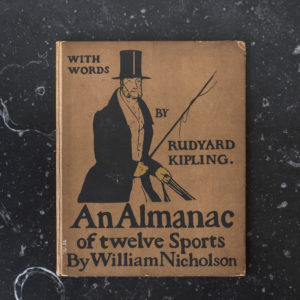
An Almanac of Twelve Sports by William Nicholson,
£550An Almanac of Twelve Sports by William Nicholson,
The Almanac was first published by Heinemann in London for Christmas 1897 with a calendar for the year 1898. Sir William Nicholson was a late 19th Century painter and print-maker. His experiments with woodcut printing encouraged the development of his distinctive pictorial style. After making his name with a series of twelve portraits of public figures (which won a gold medal at the 1900 Exposition Universelle in Paris) he moved on to produce this Almanac of twelve sports for his new publisher, Heinemann. The accompanying text was provided by the poet Rudyard Kipling. Kipling was not an enthusiastic sportsman, in fact he derided ‘flannelled fools at the wicket’ and ‘muddied oafs at the goal’ in his poem The Islanders however, after sitting for a Nicholson portrait, he agreed to provide a set of short poems to match the depicted sports. Kipling adopted a concise and suggestive style for the poems, harking back to his Departmental ditties of the 1880’s. One verse at least, the draft couplet for the coaching party depicted in August, was considered too suggestive by half and was excised by Heinemann as unsuitable for the family audience he had in mind:‘Youth on the box and liquor in the boot / My Lord drives out with my Lord’s prostitute.’
£550 -
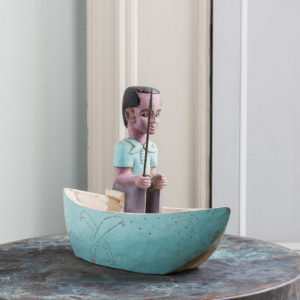
Baoulé Colon figure in a boat,
£50Baoulé Colon figure in a boat,
African colon figures originated among the Ivory Coast’s Baoulé tribe as an often satirical artistic response to colonisation and European influence. The hand-carved wooden statues commonly depict a Europeanised African middle class, or stereotypical attributes of European design – official uniforms, suits, tobacco pipes, distinct hairstyles and hats. The Baoulé waged one of the longest wars of resistance against French colonisation, and the colon style would achieve international popularity following the second World War. The figure depicts a settler travelling sturdily by canoe boat, the two pieces are not attached. Crossed-sword decorative marking motif may have symbolised a readiness to fight evil.£50 -
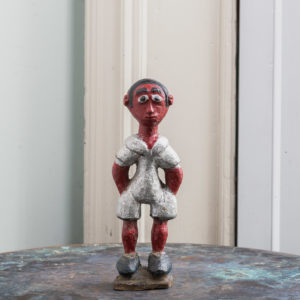
Baoulé Colon figure,
£50Baoulé Colon figure,
African colon figures originated among the Ivory Coast’s Baoulé tribe as an often satirical artistic response to colonisation and European influence. The hand-carved wooden statues commonly depict a Europeanised African middle class, or stereotypical attributes of European design – official uniforms, suits, tobacco pipes, distinct hairstyles and hats. The Baoulé waged one of the longest wars of resistance against French colonisation, and the colon style would achieve international popularity following the second World War. The figure’s clothing style and pigmentation symbolises a distinct sense of European modernity, whereby fashion and status were key symbols.£50 -
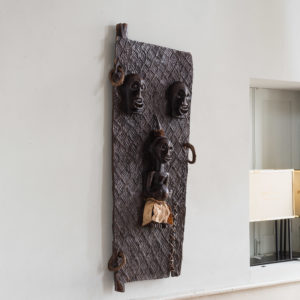
Congolese Songye door
£480 -
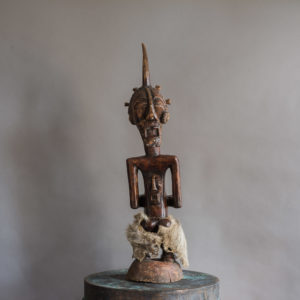
Songye Janus standing power figure,
£325Songye Janus standing power figure,
Congolese double-faced maternal power figure, adorned with animal hide and cowrie shells. The Songye power figure serves to protect its community from evil spirits.£325 -
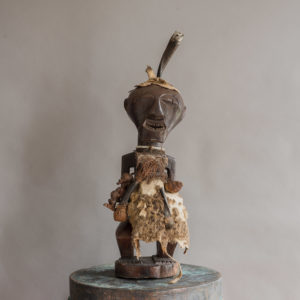
Songye standing male power figure,
£325Songye standing male power figure,
Standing male power figure from the Congolese Songye tribe, beautifully adorned with natural fibres, animal hide, and miniature power figure. These wooden power figures would have served to protect the Songye community from evil spirits and practitioners.£325 -
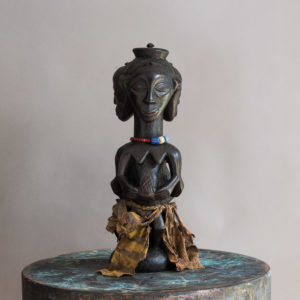
Luba-Hemba triple figural group,
£175Luba-Hemba triple figural group,
Triple maternal power figure with draped cloth fibres and checkered scarification to the belly and head. These wooden power figures would have served to protect the Songye community from evil spirits and practitioners.£175 -
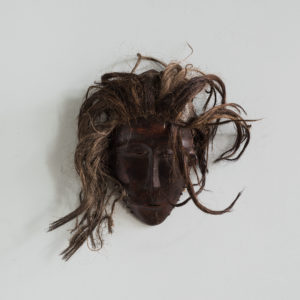
Tchokwe Pwo mask,
£245Tchokwe Pwo mask,
The Pwo is a classic Chokwe mask genre that honours their founding female ancestries as guardians of fertility and procreation. Chokwe masks were made and worn by men, often performed during the celebrations that mark a completion of initiation into adulthood and with means to honour women who had survived the difficulty of childbirth.£245 -
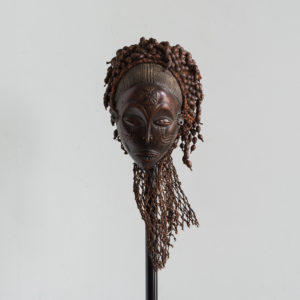
Tchokwe Pwo mask,
£165Tchokwe Pwo mask,
The Pwo is a classic Chokwe mask genre that honours their founding female ancestries as guardians of fertility and procreation. Chokwe masks were made and worn by men, often performed during the celebrations that mark a completion of initiation into adulthood and with means to honour women who had survived the difficulty of childbirth. The occasion is also said to mark the dissolution of intimate bonds between mothers and their sons, which may be represented through the tear carvings and motifs seen on the face. Further, facial scarification as seen on this mask would have been used to make the person less desirable to the spirit of death, and in women specifically would mark the birth of a baby boy.£165 -
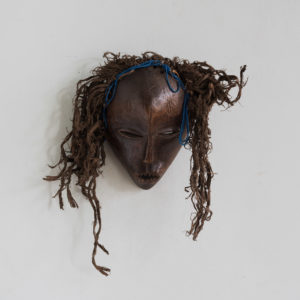
Tchokwe Pwo mask,
£195Tchokwe Pwo mask,
The Pwo is a classic Chokwe mask genre that honours their founding female ancestries as guardians of fertility and procreation. Chokwe masks were made and worn by men, often performed during the celebrations that mark a completion of initiation into adulthood and with means to honour women who had survived the difficulty of childbirth. Adorned with typical scarification designs to the face, with braided natural fibres alongside draped blue beads.£195
